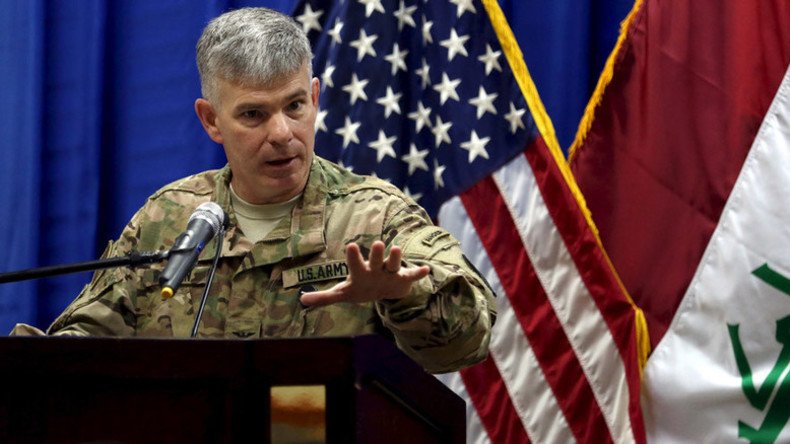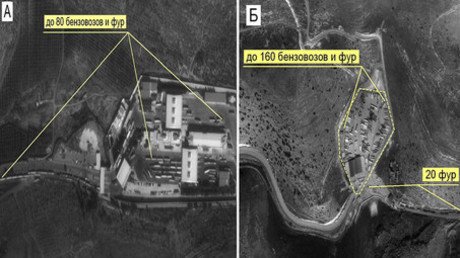'Great partners': Pentagon rejects Russian evidence of Turkey aiding ISIS

A Pentagon spokesman rejected Russia’s evidence of Turkey’s involvement in oil deals with Islamic State militants, calling Turkey a “great partner” just a day after his boss complained to Congress that Ankara was not fighting ISIS enough.
“Let me be very clear that we flatly reject any notion that the Turks are somehow working with ISIL,” said Colonel Steve Warren, spokesman for the US-led coalition fighting against Islamic State (IS, formerly ISIS/ISIL). “That is preposterous and kind of ridiculous. We absolutely, flatly reject that notion.”
Operation Inherent Resolve Spokesman Steve Warren: We flatly reject the notion that #Turkey is working with #ISIL. pic.twitter.com/o4ZS2mW9le
— Zaid Benjamin (@zaidbenjamin) December 2, 2015Warren was responding to questions about the evidence presented by the Russian Defense Ministry on Wednesday, including satellite photos and maps pointing the finger at Turkey – and President Recep Erdogan personally – for aiding the militants in smuggling oil.
“The Turks have been great partner to us in the fight against ISIL. They are hosting our aircraft, they are conducting strikes, they are supporting the moderate Syrian opposition,” Warren told reporters during a weekly Pentagon briefing from Operation Inherent Resolve headquarters in Baghdad. “They’ve been good partners here. Any thought that the Turks, that the Turkish government is somehow working with ISIL is just preposterous and completely untrue.”
Just yesterday, however, US Defense Secretary Ash Carter was telling the House Armed Services Committee that most of Turkey’s military operations were directed against the Kurds, rather than the self-proclaimed Islamic State.
“Most of their air operations are not directed at ISIL,” Carter told lawmakers. “They are directed at the PKK, which we understand their concern about — it’s a terrorist organization within their borders — but we would like to see them do more against ISIL.”
Turkey’s ops not directed at Islamic State – Pentagon head to US Congress https://t.co/vc4GdGR5L7pic.twitter.com/0u4XLlVY8e
— RT America (@RT_America) December 2, 2015The State Department likewise dismissed the Russian evidence as “untrue,” though spokesman Mark Toner admitted that he had not seen the photographs and only heard about them secondhand. Toner echoed Warren’s remarks, saying the smuggling operation something that is “decades old.” He ventured that IS does not profit from the illegal trade directly, but only through extorting toll fees from the smugglers.
Warren had previously said the oil smuggling “goes back decades,” and that the US was working to stop it by having Turkey tighten its border controls.
While the US has acknowledged that oil smuggling is a major source of revenue for the IS, the US-led coalition had not bombed any of the tankers until mid-November, following an announcement from Moscow that Russian planes would begin striking the convoys described as a “living pipeline.”
The outspoken rejection of Russia’s evidence by State Department and Pentagon spokesmen not only clashed with Secretary Carter’s remarks, but also with an assessment made last year by US Vice-President Joe Biden.
In a speech at Harvard University last October, Biden suggested that US allies in the Middle East were so eager to overthrow the Syrian government that they were pouring “hundreds of millions of dollars and tens of thousands of tons of weapons” into supporting opposition fighters – including jihadists like Al-Qaeda and what would become IS.
Biden specifically mentioned Turkey, Saudi Arabia, and the United Arab Emirates. After the outraged Erdogan demanded an apology, Biden said he was sorry for any implication that Turkey might have helped “ISIL or other violent extremists in Syria,” according to the White House.
On Wednesday, the Russian Defense Ministry presented photographic evidence showing hundreds of oil tanker trucks moving to and from Turkey through IS-controlled territory. A major source of the militants’ revenue, oil is smuggled out of Syria and Iraq along three major routes – one on the Turkish coast and two in southeastern Turkey, at Batman and Cizre – according to Lieutenant General Sergey Rudskoy.
Map, images from Russian military show main routes of ISIS oil smuggling to Turkey https://t.co/3g1MQxzfNFpic.twitter.com/LSlBFUlgqc
— RT (@RT_com) December 2, 2015In addition, up to 2,000 fighters, 120 tons of ammunition, and 250 vehicles have been delivered to Islamic State and Al-Nusra militants from Turkish territory over the last week alone, said Lieutenant General Mikhail Mizintsev.
“According to reliable intelligence reports, the Turkish side has been taking such actions for a long time and on a regular basis. And most importantly, it is not planning to stop them,” Mizintsev said.













